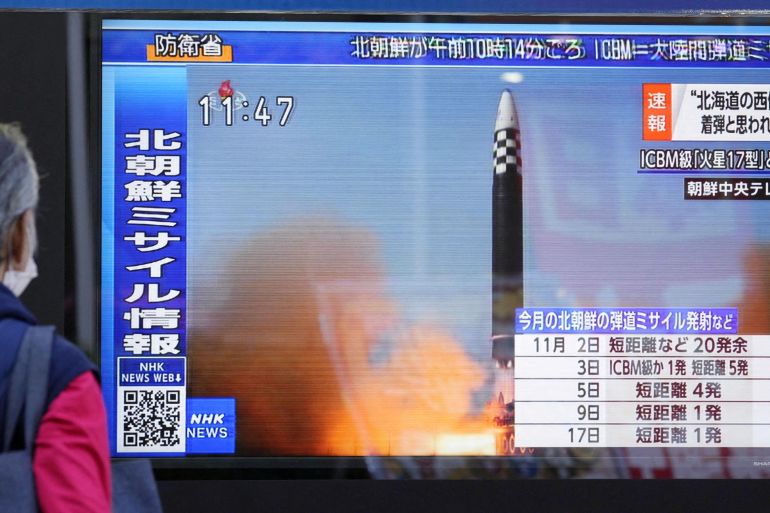UN Security Council members condemn North Korean missile launch
US among 14 countries that slam Pyongyang’s recent launch of intercontinental ballistic missile as ‘dangerous escalation’.

A divided United Nations Security Council has condemned North Korea’s recent launch of an intercontinental ballistic missile but stopped short of issuing a formal statement due to opposition from China and Russia, diplomats said.
The United States, Britain, France and India were among 14 nations to “strongly condemn” Friday’s launch. The missile landed about 200km (125 miles) from Japan’s coast and was reported to have the range to reach the US mainland.
Keep reading
list of 3 itemsNorth Korea’s Kim Jong Un reveals daughter at missile launch
‘Excessive’: North Korea’s COVID curbs blamed for food crisis
“This represents a serious escalation and poses an unequivocal threat to international peace and security,” the countries said in a joint statement on Monday after a Security Council meeting.
They urged the council to limit the advancement of North Korea’s weapons programmes.
North Korea has carried out an unprecedented number of ballistic missile launches this year, drawing condemnation and concern in neighbouring countries as well as in Washington.
But Pyongyang has long defended its launch of ballistic missiles as a legitimate defence against what it calls a decades-old threat from the US and its allies in South Korea. Friday’s launch was carried out shortly after the country warned of “fiercer military responses” to Washington.
“Kim Jong Un solemnly declared that if the enemies continue to pose threats, … our party and government will resolutely react to nukes with nuclear weapons and to total confrontation with all-out confrontation,” Pyongyang’s official Korean Central News Agency reported.
North Korea’s foreign minister on Monday accused UN Secretary General Antonio Guterres of siding with Washington and failing to maintain impartiality and objectivity. Choe Son Hui said it is Pyongyang’s right to develop weapons for self-defence.
‘Upward spiral’
For months, the US has been pushing the Security Council to impose tougher sanctions on North Korea as it carried out a barrage of missile tests. The council has passed nearly a dozen resolutions imposing sanctions on North Korea over its nuclear and missile activity since 2006.
A senior US official said this month that Washington believes China and Russia have leverage to persuade North Korea not to resume nuclear testing, and US President Joe Biden told his Chinese counterpart last week that Beijing has an obligation to try.
On Monday, China’s UN ambassador, Zhang Jun, said Beijing was “concerned” by the “upward spiral of rising tension and intensifying confrontation” on the Korean Peninsula but said the Security Council should help ease tensions and not always condemn or pressure Pyongyang.
He said the US should take the initiative and put forward realistic proposals to respond to North Korea’s “legitimate concerns”.
“All parties should remain calm, exercise restraint, act and speak with caution, and avoid any actions that may escalate tensions and lead to miscalculation so as to prevent the situation from falling into a vicious cycle,” Zhang said.
Russia’s deputy UN ambassador, Anna Evstigneeva, accused the US of trying to force North Korea into unilateral disarmament though sanctions and force, and blamed the missile tests on military drills by Washington and its allies.
For her part, the US ambassador to the UN, Linda Thomas-Greenfield, said it was vital that the 15-member Security Council respond with one voice, accusing Beijing and Moscow of “emboldening” Pyongyang by blocking action.
“These two members’ blatant obstructionism puts the Northeast Asian region and entire world at risk,” she said.
Thomas-Greenfield also said the US planned to propose a presidential statement at the Security Council to hold North Korea “accountable for its dangerous rhetoric and its destabilising actions”.
A spokesperson for the US mission to the UN said a draft president’s statement would be shared with the Security Council soon and negotiations would follow.